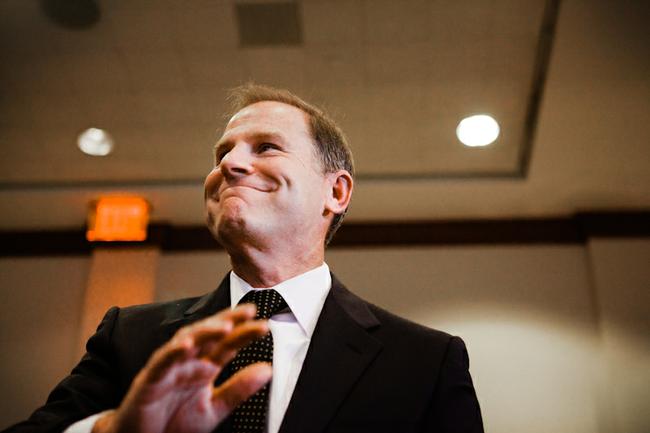During Thursday’s Faculty Council meeting, faculty gave input to interim Vice President for Human Resources Kelley Stuck and Human Resources Consultant Tim McIntosh about what qualifications they wish to see in the next UM System president, including experience in education and listening skills.
“Someone who’s not (former UM System President) Tim Wolfe,” Faculty Council Vice Chairwoman Nicole Monnier said.
Council members responded with laughter. Many members expressed their displeasure with Wolfe’s lack of higher education experience.
“He was probably a pretty good strategist, but he was a terrible leader,” council member Art Jago said.
The faculty who spoke said they wished to have a president who has experience in higher education and an understanding of how universities are run. Some said they want the next president to be required to have a doctoral degree. Other said they didn’t believe having a doctoral degree was necessary.
“He doesn’t have to be a sitting academic, but needs to have a good understanding of how universities work,” council member John Gahl said.
Council member Vitor Trindade said he thinks higher education experience is important.
“I think what that speaks to is someone who has a strong relationship with higher education, not someone who comes out of IBM,” Trindade said, referencing Wolfe’s former employer.
Council member Rebecca Graves said she believes it’s key for the next president to be a good listener and able to handle criticism.
Shortly after becoming president in 2012, the chair of the Board of Curators, Warren Erdman, called Wolfe the “best listener” he had ever met.
“He genuinely wants to learn from every conversation,” Erdman told [Inside Columbia magazine](http://www.insidecolumbia.net/April-2012/Answering-The-Call/). “He respects the opinions and experiences of others and really applies what he learns to his own informed decision-making.”
Council member Mary Stegmaier said she thinks it’s important for a president to be interested in students.
“Someone who has an interest in learning about what the student experience is like, learning about the challenges they’re facing … someone who has genuine interest in learning about students,” Stegmaier said.
Some faculty member raised concerns about candidates who might not wish to apply because of MU’s notoriety in the news recently.
Stuck said the point was valid.
“In working with the search firm, what we expect is for there to be a smaller search pool, but very robust in terms of level of candidates,” Stuck said. “I don’t think it’s impossible at all to get an incredible leader, we just might have to work a little harder.”
The council also discussed the greater inclusion of faculty and student voices in the current search. [The 2016 presidential search committee](https://www.themaneater.com/stories/2016/3/14/board-curators-announces-presidential-search-commi/) consists of two faculty members, one staff member, one student, two UM System alumni co-chairs, the Board of Curators and the student representative to the board. All will be voting members. The 2011 Presidential Search was criticized for having a non-voting advisory committee that only met with one finalist, Tim Wolfe, as opposed to multiple candidates.
“There were two candidates and one dropped out, so they got to meet the candidate pool named Tim Wolfe,” Faculty Council Chairman Ben Trachtenberg said.
Council members expressed a desire to have public forums before the president is selected to meet the finalists. Stuck said this is a divisive topic. Some candidates, often strong ones, Stuck said, drop out if their name is to become public because they don’t wish their employer to discover they are applying for another job. On the other hand, it is more transparent to make candidates’ names public and allows for greater faculty, staff and student input.
Bill Wiebold, a council member who also served on the 2011 Presidential Search Advisory Committee, said he believes given the criticism of the 2011 search, it would be beneficial to hold public forums.
“You know, once burned, twice cautious,” Wiebold said. “And I was burned once before on the previous presidential search. It would go a long way to dispel that the Board of Curators are going to do what they want anyhow if you would have a public forum for the candidates.”
_Edited by Taylor Blatchford | [email protected]_














